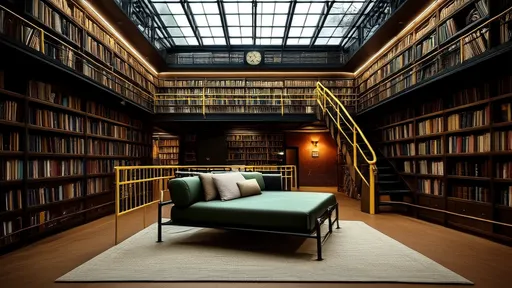In the heart of the bustling city, where the hum of traffic and the chatter of pedestrians never seem to cease, an unexpected sanctuary has emerged. The Library Hotel, a once-forgotten repository of knowledge, has been transformed into a haven for weary travelers and locals alike. Its latest innovation? Soundproof sleeping pods carved from the very shelves that once held countless stories. This ingenious repurposing of a historic library has captured the imagination of urban dwellers seeking respite from the noise of modern life.
The concept is as simple as it is brilliant. The hotel’s architects took the building’s original structure—a grand, early 20th-century library with towering bookshelves and thick stone walls—and reimagined its quiet nooks as private sleeping chambers. Each pod is nestled between what were once aisles of literature, now insulated with sound-absorbing materials to create a cocoon of silence. The result is a series of intimate, book-lined retreats where guests can escape the cacophony of the city without ever leaving its center.
The transformation wasn’t without its challenges. Preserving the building’s historic charm while adapting it for modern use required a delicate balance. The original oak shelves, worn smooth by decades of use, were carefully reinforced and fitted with sliding panels to create privacy. Glass ceilings were installed in some pods, allowing natural light to filter through while maintaining the hushed atmosphere. The designers even repurposed old library ladders as quirky bedside tables, a nod to the space’s former life.
What sets these sleeping pods apart is their attention to acoustic detail. Unlike traditional hotel rooms, where thin walls often betray the presence of neighbors, these pods are engineered for silence. Layers of recycled denim insulation, a favorite among soundproofing experts for its eco-friendliness and effectiveness, line the walls. The doors, modeled after the library’s original heavy wooden ones, seal with a satisfying thud, shutting out the world beyond. Guests frequently remark on the surreal experience of stepping from the lively hotel lounge into what feels like a vacuum of quiet.
The response from the community has been overwhelming. Night owls who once struggled to find late-night workspaces now flock to the hotel’s 24-hour reading lounge, where the pods offer a perfect place to nap between study sessions. Business travelers, too, have embraced the concept, praising the pods’ ability to provide uninterrupted rest during short layovers. Even locals, desperate for a quiet afternoon escape, have been known to book a pod just to read or meditate in peace.
Perhaps most surprising has been the pods’ appeal to book lovers. There’s something undeniably magical about falling asleep surrounded by the scent of old paper and leather bindings. The hotel has capitalized on this by curating small collections of vintage books in each pod, tailored to guests’ preferences upon request. A history buff might find themselves dozing off next to a first edition of a Churchill biography, while a romance enthusiast could discover a worn copy of Austen’s Pride and Prejudice on their bedside shelf.
As word spreads, other cities with underutilized library spaces are taking note. The success of this project suggests a new model for preserving historic buildings while meeting contemporary needs. In an age where quiet is becoming an increasingly rare commodity, the Library Hotel’s sleeping pods offer more than just a place to rest—they provide a momentary return to the contemplative silence that libraries have always represented. It’s a reminder that sometimes, the best innovations come not from building anew, but from listening to what old spaces have to tell us.

By /Jul 16, 2025

By /Jul 16, 2025

By /Jul 16, 2025

By /Jul 16, 2025

By /Jul 16, 2025

By /Jul 16, 2025

By /Jul 16, 2025

By /Jul 16, 2025

By /Jul 16, 2025

By /Jul 16, 2025

By /Jul 16, 2025

By /Jul 16, 2025

By /Jul 16, 2025

By /Jul 16, 2025

By /Jul 16, 2025

By /Jul 16, 2025

By /Jul 16, 2025

By /Jul 16, 2025